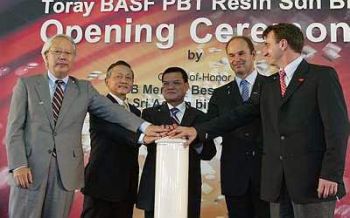The blog posted last month the possibility of Genomatica licensing its bio-based 1,4 butanediol (BDO) processing technology to BASF after Toray announced that it has successfully produced prototypes of partially bio-based PBT (polybutylene terephthalate) engineering plastic components using Genomatica’s bio-BDO.
If readers recall, the blog noted BASF’s Malaysian subsidiary BASF Petronas Chemicals is currently supplying petroleum-based BDO to Toray BASF PBT Resin Sdn Bhd – a 50/50 JV between Toray and BASF that manufactures PBT in a 60,000 tonnes/year facility in Kuantan, Malaysia.
Late last week, BASF announced that it plans to begin production of bio-BDO using Genomatica’s one-step fermentation process, which uses sugar for feedstock. BASF did not disclose where it will produce bio-BDO or how much it will produce but the company said the bio-BDO it will produce will be available in the second half of 2013 for sampling and trials.
The license agreement allows BASF to build a world-scale Genomatica-based bio-BDO production facility. According to a BASF spokesperson, the construction of a large plant is subject to market acceptance of bio-based BDO.
“Currently we anticipate a plant capacity of 50,000 tons/year. At this point in time, BASF plans to provide quantities of renewable BDO to market to better understand overall market acceptance and demand.” – BASF
The blog asked whether the bio-BDO that will be produced from a large scale capacity will be blended in to the company’s current supply chain or will it be separated in terms of marketing and production. BASF said it intends to use the bio-BDO to tap markets in which the company can create additional value to their customers such as in the textile, automotive and plastics markets.
Another question posed by the blog is the economics of a bio-BDO via Genomatica’s process compared to the company’s current petroleum-based BDO production.
“Since this is the first renewable BDO in the world which is manufactured by an industrial-scale process, it is difficult to estimate the growth and size of this product. The growth will depend on acceptance of renewable-based BDO along the value chain and of end-consumers as well as regulatory requirements. Furthermore, a formal lifecycle assessment is under development.” – BASF
Finally, the blog can’t help but recall that BASF is also into bio-succinic acid via its 50-50 JV with CSM/Purac called Succinity GmbH.
Succinity is building a 10,000 ton/year bio-succinic acid plant in Purac’s Montmelo site in Barcelona, Spain, and is expected to start by the beginning of 2014, according to Tecnon OrbiChem’s April newsletter on maleic anhydride (subscription). An expansion to 50,000 tons/year is expected some time after 2015 but details on timing are not yet available.
According to Tecnon OrbiChem, succinic acid can be used to replace maleic anhydride to make bio-BDO through hydrogenation. BDO would be the biggest volume application and could in theory displace a considerable amount of maleic anhydride. However, the report pointed out that some in the industry view the succinic acid-to-BDO route as not a very economical process, compared with the manufacture of BDO by direct fermentation.
Bio-succinic acid producers BioAmber and Myriant both announced in the past their plans to enter the BDO market via the bio-succinic acid route. In fact, BioAmber has been contemplating producing bio-BDO through its joint venture with Mitsui.
According to BioAmber, around 30,000 tons of bio-succinic acid can be converted into 22,000 tons of bio-BDO. BioAmber estimated theoretical yield for producing bio-BDO via succinic acid is at 85% with 1.2kg of sugar needed to produce 1kg of bio-BDO.
BioAmber has secured a technology from DuPont to convert bio-succinic acid to bio-BDO, THF and GBL, and has also partnered with Evonik to optimize and scale-up the DuPont catalysts. By the way, BioAmber recently completed its IPO, which hopefully the blog will able to post something about it soon.
Back to succinic acid-to-BDO, Myriant, on the other hand, has partnered with Davy Process Technology Ltd. for the licensing of a process to produce bio-BDO using Myriant’s bio-succinic acid.
Back in 2011 when the partnership was announced, Myriant said it has been working exclusively with Davy to integrate and optimize each other’s processes to further reduce the costs of producing bio-succinic acid for BDO applications.
Given BASF’s involvement in the bio-succinic acid market, the blog asked the company its view on the succinic acid-to-BDO route.
“The biobased succinic acid is not meant as a starting material for the production of BDO but it will be used to cause special properties for example in bioplastics and polyurethanes.” – BASF
BASF currently produces BDO using natural gas, butane, butadiene and propylene for feedstock and has production facilities in Germany, Louisiana, Japan, Malaysia and China with annual capacity of 535,000 tons. The company recently announced its plans to build another BDO complex in China with a capacity of 100,000 tons/year.
FOLLOW ME ON THESE SPACE
Discussion
Comments are closed.